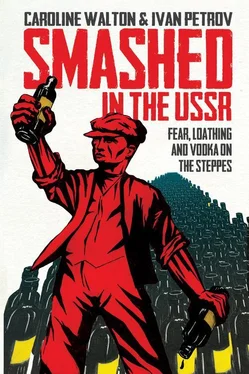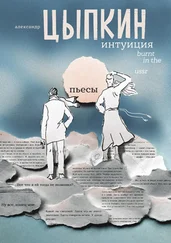Unlike me, however, most people work, or at least give the impression that they’re working. And for what? Just to drink away their pay at the end of the month. Many men claim they work for the sake of their family. But what’s the good of an alcoholic in a family? How do they pay for their babies’ milk? By collecting empty bottles? And I’ve seen children tremble at the sound of their fathers’ footsteps. At least I had the honesty to ditch the pretence and take to the road, although it cost me my wife and daughter.
The worst thing you can do to someone else is humiliate them, but self-degradation is no less evil. The person who humiliates himself drags others down with him. I’ve seen this happen often enough and I don’t want to be guilty of it too. Yes, I made the right decision back in that forest in the Kuban. I’m responsible only to myself now. Yet the one question remains: how am I going to live? I won’t steal and it’s hard to find work, so how will I buy my drink? In practice I’m almost a beggar, and I’m trying not to admit it. I shut my eyes to the truth. But when all is said and done I have to acknowledge what I am.
Why am I not ashamed to accept Borya’s money while I refuse to hold out my own hand in the street? I don’t consider myself better than him. It’s not the first time a beggar has bought me a drink. I can’t bring myself to beg, yet I drink at someone else’s expense which is worse.
Another part of me interrupts: but beggars also live at others’ expense.
No, I correct myself, beggars support themselves. They earn their kopecks through self-abasement.
All the same, I am mistrustful of beggars. I have known hundreds: on the streets, in camps, police cells and psychiatric institutions. Most of them are scoundrels and hypocrites. Many times I’ve heard them ask a passer-by: “Give me a few kopecks for the love of God.”
When the person passes on they curse: “May you rot in hell you greedy bastard!”
I sometimes ask them: “How can you talk like that? It’s up to them whether they give to you or not. Besides, people might overhear and what would they think of you then?”
“Fuck them. They are many and I’m only one. If one passes by another will drop something in my cap. Only God sees everything!”
But it’s not for me to sit in judgment. Everyone lives as they can.
In former times whole villages worked as beggars, training their children to follow the family profession. These beggars roamed the countryside, pretending to have lost all their worldly goods in a fire. Others hung around stations asking for the price of a ticket, claiming all their money and documents had been stolen. In Astrakhan camp I met a man who spent years selling a saw outside Moscow stations. He worked with great artistry, dividing his time between Moscow’s eleven termini. His victims were officers: none below the rank of major. He would go up to the officer, salute, stand to attention and bark: “Comrade Colonel! May I introduce myself? Sergeant-Major Sidorov, of the 187th Standard Bearers, guards division, Order of Suvorov!”
“What can I do for you, Sergeant-Major?”
“Excuse me, Comrade Colonel! Could you buy my saw?” Sidorov would bring out a wrapped-up saw from behind his back.
“But why should I buy your saw, Sergeant-Major?”
“I want to rejoin my family but I need 23 roubles for the ticket. I’ll sell you the saw for five.”
“Haven’t you been to the Commandant’s office?”
“Of course, Comrade Colonel, but as everyone knows, they’re just a bunch of pen-pushers. They’ve never smelled gunpowder. I remember, now, near Breslau…”
At this point the colonel usually pulled out his wallet and gave Sidorov a 25-rouble bill. If the officer was at all suspicious he might ask: “Who was the commander at your Front?”
“Marshall Zhukov, Comrade Colonel!” replied Sidorov with shining eyes. “Now there was a true officer! He loved his men.” Sidorov had learned the history of the 187th Standard Bearers off by heart. If the officer asked any tricky questions Sidorov would reply: “I don’t remember. I was in hospital at the time, wounded in action.”
Sidorov continued to offer his saw for six years. In the end people got to know him and he grew careless, accosting officers when he was already drunk. Finally he was arrested and sent to camp. But he was a born actor and the way I saw it he earned his drinks.
Like Sidorov and Kalinin, plenty of beggars earn their money through guile, but most play on pity. It is simpler and yields good results. I know that almost every human being is capable of feeling pity — perhaps even Cannibal — but I can’t bring myself to exploit this feeling.
For my part, I admit I often earn my drinks through wit. I try to entertain, even when I don’t feel like it. I survive by making people laugh. In a way my crippled leg helps because no one feels threatened by me.
Yet there is a difference between singing for your supper and holding out your hand for it. I fear begging as a way of life. It might be too easy. If I drop anchor outside some church or bazaar I might never return to a normal existence. And I still entertain hopes in that direction. Hope is the last to die and I clutch at it, sustained by memories of the past.
The evening is dark and rainy. When Borya arrives we take shelter in a half-constructed building near the park. I gather some rubbish and make a small bonfire. We spread newspapers on the cement floor and sit talking. I get completely pissed but Borya drinks nothing. He has a hot-water bottle tied to his thigh and urine trickles into it almost constantly. This embarrasses him so he tries not to drink, even refusing water.
Borya tells me more about his life. “Once I went to a public library in Leningrad to try to read something on begging, but I was disappointed. No one writes the truth. They slide over the surface of the question. Perhaps because they never write from the point of view of the beggar. Not even Dostoevsky. As for Tolstoy, he was a great sham. He went out punctually every day to give alms but before he would part with a kopeck he took away the beggar’s very soul with his nosy questioning.
“The truth is, when I beg I inspire pity, and pity is always a blessing, no matter how dirty the soul in which it springs,” Borya concludes.
“I can’t agree with you,” I say. “Pity is a good and natural emotion, but do you remember Yesenin’s lines: arousing tears in my heart is like throwing stones at the glass of my watch ? Only a wretch would deliberately try to awaken a person’s compassion. It’s a cheap thing to do.”
Yet I can’t criticise Borya for I realise that my way of life is essentially no different to his. The only distinction between us is that I don’t see myself as a person who does good to others. Anyone who does good becomes a slightly better person himself, but if you plan in advance to do good then the deed loses all its grace. If I do good, then let it be by accident. Most likely I do no good at all in this world, and I certainly won’t do so by begging.
Our divergent views spring from a more fundamental difference. “Borya,” I observe, “you believe in God, but I don’t. If there was a God there would be justice, and as there’s none in this world, so there can be no God.”
Borya objects: “But you can’t judge God by your own standards of right and wrong. It is impossible to comprehend God. You simply have to believe.”
“I can’t ‘simply believe’ when life is so unfair. Why was I born here, now, in a country where it makes no difference which side of the barbed wire you are on? Why did you fall under a train?”
“Humanity doesn’t yet have the wisdom to test whether there is justice or not,’ Marcus Aurelius said that almost twenty centuries ago.”
Читать дальше

![Геннадий Марченко - Перезагрузка или Back in the Ussr. Книга 1. [СИ]](/books/53319/gennadij-marchenko-perezagruzka-ili-back-in-the-uss-thumb.webp)







